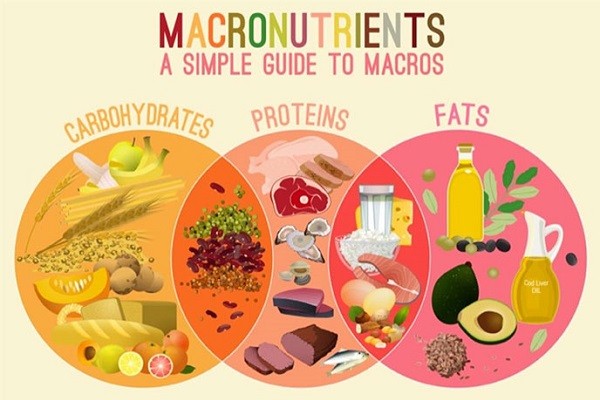
Why You Need to Track Macronutrients and Not Calories
Posted by Dayne Hudson
Estimated reading time: 5 minutes

Firstly, a macronutrient is a chemical substance (like protein) that's required in large amounts to the growth and health of a living organism.
The three macronutrients in our diets are protein, fat, and carbohydrates, and are all required in a certain amount for optimal functioning.
Firstly, protein is what drives muscle growth and recovery, you're likely aware of this!
And whether you prefer lifting weights, playing tennis, or sprinting in the park, protein is essential.
But it's proteins' role in satiety that is often overlooked!
In comparison to the other macronutrients carbohydrates and fat, protein is superior when it comes to keeping you full. This makes it the best macronutrient to consume when weight loss is the goal.
And it gets better: when you eat a gram of protein you're eating 4 calories. You're also eating 4 calories when you eat a gram of carbohydrates, but eat a gram of fat, and you're consuming 9 calories. That's more than double.
And the third reason protein is better than the other two macronutrients for weight loss, is because of the energy your body requires to break it down during digestion. To elaborate, we know:
Protein = 4 calories per gram.
Carbohydrates = 4 calories per gram.
Fat = 9 calories per gram.
Whilst it seems like protein and carbohydrates are even, it's not the case! Protein is just under 4 calories because of the energy required by the body to break it down.
Specifically, you lose 20-30% of the calories from protein in the digestion process; so when you consume 100 calories from protein you're actually really consuming 70-80 calories.
For carbohydrates, that percentage is 5-10% and only 0-3% for fat.
So back to our table to see the REAL caloric value of macronutrients:
Protein = more like 2.8 calories per gram (down from 4)
Carbohydrates = more like 3.6 calories per gram (down from 4)
Fat = more like 8.73 calories per gram (down from 9)

So you can see why protein is the winner, and why most fat loss diets are encouraged to be high in protein.
And whilst this knowledge is great, it's only one piece of the puzzle.
Because the difference between you succeeding with your fitness goals or not is knowing how much of each macronutrient to eat daily.
Whilst diving into how to calculate your macronutrients for fat loss is beyond the scope of this article, most diets are calculated so that you eat 500 calories less than your body burns daily. This ensures that fat is burnt.
So say Bulk Nutrients customer "Taylor" is a 34-year-old female who burns 2100 calories a day (calculated by knowing her age, weight, and daily exercise routine). For an optimal fat loss diet, Taylor would need to consume 1600 calories per day (a 500 calorie deficit).
This means that every day, Taylor could eat:
Protein: 160 grams (640 calories)
Carbohydrates: 90 grams (360 calories)
Fat: 66 grams of fat (594 calories)
Total: 1594 calories
This means that Taylor would eat certain foods that she knew would fit within her macronutrient requirements for each day and cook/purchase food that ensured she stayed within these guidelines.
By looking at the labels of everything she ate, Taylor would know if she was eating too much.
Now, if Taylor eats more than her allocated macronutrients, she will reduce the size of her 500 calorie deficit and thus not lose as much weight and get the progress she wants.
And this is why people fail when trying to lose weight: they eat above their allocated number of macronutrients for too long, because they crave high-calorie foods and "splurge", or lose interest entirely.

With all this information in mind, you should now be able to make sense of the "macro" conversations you've heard over the years.
Real-world translations:
Gym goer: "I'm not eating all those donuts, they're too high in macros"
Translation: There's way too much fat and carbohydrates in that, and I'm trying to lose fat!
Gym goer: I can eat that chocolate bar, it fits my macros!
Translation: I can still eat that chocolate bar and be under the required amount of protein, fat, and carbohydrates I need to eat in a day. So, I won't gain weight!
Gym goer: "I love chicken breast, it's got great macros"
Translation: The protein will keep me full, and there are minimal fat and carbohydrates, so I'm not over-consuming calories.
Gym goer: I'm on an IIFYM diet, I've lost four kilos!
Translation: IIFYM stands for "If It Fits Your Macros." It's a flexible approach to dieting that says you can eat that chocolate bar "if it fits" within your allocated daily amount of protein fat and carbohydrates, as no fat can be gained.
The bottom line is that macronutrients or "macros" refer to protein, fat and carbohydrates, and knowing how much of these we can eat daily as tuned to a weight loss diet is critical. Protein is encouraged to be consumed first because of its benefits to satiety and muscle growth/recovery. When people are talking about foods "fitting their macros" they're talking about how much protein fat and carbohydrates a food contains, and how that relates to how many they can eat daily. This is often shortened to "IIFYM" which stands for "if it fits your macros." It is otherwise known as flexible dieting.

Like many, Dayne was once desperate to lose weight and get into shape. But everyone he asked, everything he read, lead to the same place... nowhere.
His journey started there - researching science journals and completing a Sports Nutrition Specialist qualification so he could make weight loss easier.

Posted by Dayne Hudson
Estimated reading time: 5 minutes

Posted by Nicole Frain

Posted by Jackson Peos
Estimated reading time: 10 minutes
With over 700 recipes and articles, the Bulk Nutrients Blog has something for everyone! Find a new workout, meet our ambassadors or take a deep dive into our products today.
We're an Australian manufacturer and supplier of high quality sports supplements.
Operating since 2008, Bulk Nutrients has become one of the premier Australian brands to supply nutritional products to top level athletes, competitors and those on a journey to a healthier lifestyle.
One thing that sets Bulk Nutrients apart is that we love to talk to our customers!
Whether you need product advice, help with the website or need a change made to your order... call us on +61 3 6266 4725.
If you prefer email you can email us day or night at info@bulknutrients.com.au
For online chat, hit the 'Chat' button in the bottom right hand corner of your screen and you'll be connected to one of our lovely customer service team.
Or if you'd like to get in touch through our online contact form, that's cool too!
Terms & ConditionsSustainability StrategyPrivacy PolicyPayment InformationSitemap
All prices are in Australian dollars (AUD) and include GST unless otherwise stated.
All content copyright © Bulk Nutrients 2008 - 2024